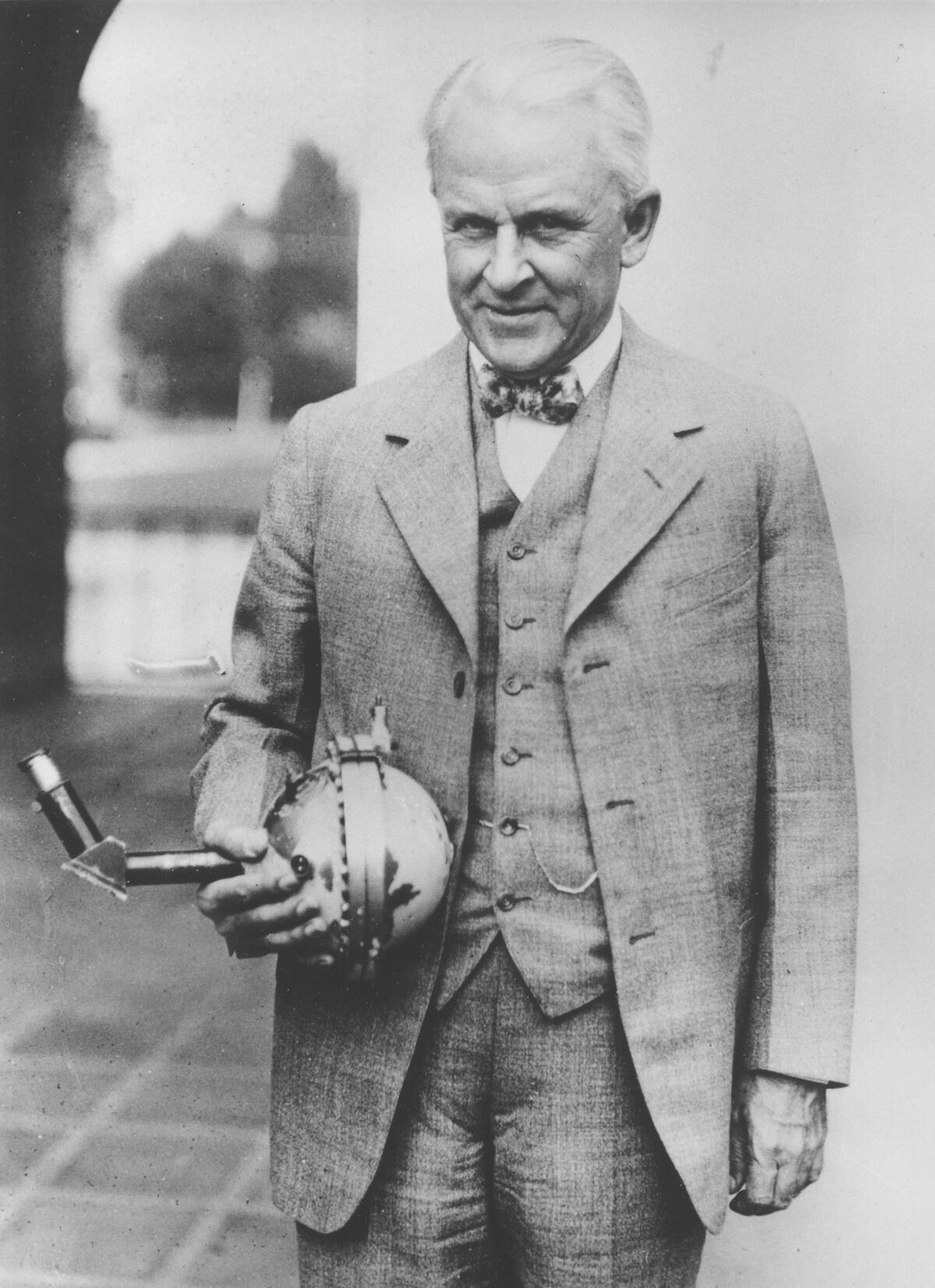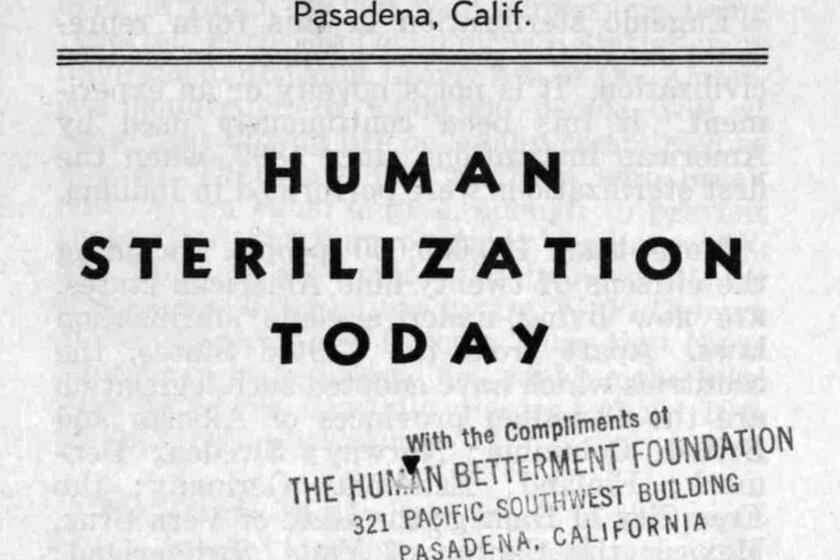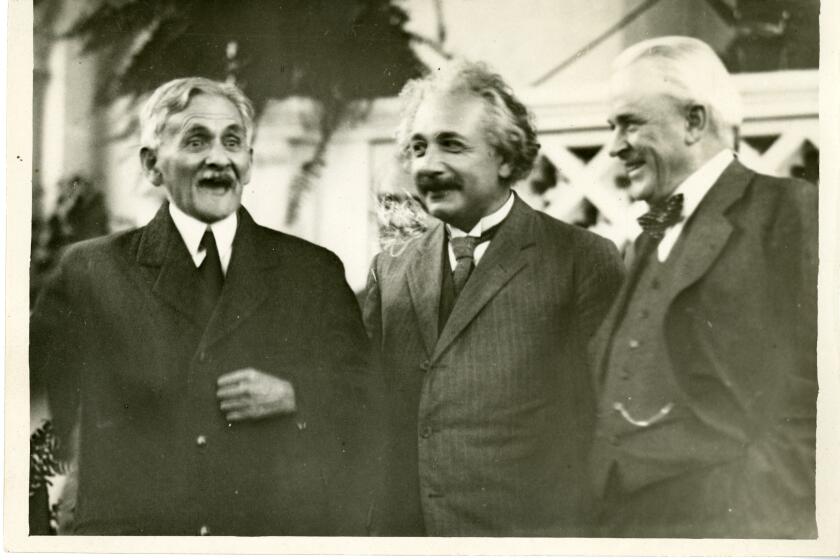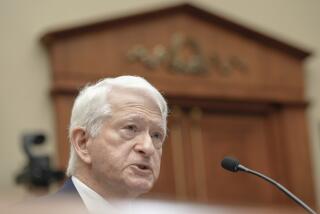Column: Confronting a racist past, Caltech will excise names of eugenics backers from campus

- Share via
Having traveled the difficult road of coming to terms with racism in its own past, Caltech on Friday said it would remove the names of Robert A. Millikan and five other important figures in its history from campus.
The reason is their association with the Human Betterment Foundation, a major promoter of the discredited science of eugenics and of programs to forcibly sterilize those whom eugenicists labeled “feeble-minded” or “unfit.”
The move amounts to a major reckoning with the university’s history. That’s especially true as it applies to Millikan, who has traditionally been more closely identified with Caltech’s emergence as a leading scientific institution than any other individual.
It would fly in the face of historical truth to excuse sexism, racism, and xenophobia as inevitable and universal in Millikan’s time.
— Caltech Committee on Naming and Recognition
Millikan served as Caltech’s president for 24 years, longer than anyone else. He was the institution’s first Nobel laureate — in physics in 1923, for establishing the elementary charge of the electron.
His name has adorned buildings, rooms and a pond on the campus as well as a biology professorship and numerous academic awards; the nose on his bust overlooking a campus walkway has been worn to a bronze luster by generations of students rubbing it for luck before taking their exams. (The bust will be removed from its location, Caltech says.)
All the campus features will be renamed in accordance with the recommendations of a committee on naming and recognition that were made public Friday, after they were accepted by Caltech President Thomas F. Rosenbaum. Among other changes, the Robert A. Millikan Library will be renamed Caltech Hall.
“This is not about erasing history,” Rosenbaum told me. “You have to understand your history and make sure that you tell your history in its full richness, good and bad. But there is a distinction between history and monumentalization. Buildings are monuments — they’re symbolic and they’re powerful statements of what an institution is about.”
Caltech’s revered Robert Millikan favored forced sterilization. Can the university come to grips with its past?
Rosenbaum says he strived to make the historical reconsideration a community effort. The committee comprised faculty, staff, students, graduate students, alumni and trustees. “I charged them with looking at original sources — let’s get the history right about Millikan, eugenics, his role and all his contributions,” he says.
Among the other historical figures whose names will be excised from the campus is Harry Chandler, publisher and proprietor of The Times from 1917 until his death in 1944. From 1935 to 1941, The Times published a weekly column titled “Social Eugenics” by one Fred Hogue, a eugenics enthusiast. In one 1936 column, Hogue praised “the movement in Germany and other Nordic countries of Europe for the elimination of reproduction of the unfit.”
Chandler’s name will be removed from a dining hall on campus.
The other figures are Ezra Gosney, founder of the Human Betterment Foundation, whose name is on a research fund; Albert Ruddock, whose name is on a residence hall and a biology professorship; Henry M. Robinson, whose name is on a laboratory building; and William B. Munro, whose name is on a seminar series. Ruddock, Robinson and Munro were all founding trustees of the foundation; Millikan and Chandler joined its board after its creation, Millikan in 1937.
During his reign at Caltech, from 1921 to 1945, Millikan was one of the best known and most respected scientists in the country. Simultaneously, he was helping to steer the Human Betterment Foundation, which tarnishes a legacy that extends well beyond Caltech — Millikan’s name adorns streets and public schools across the Southland.
The drive to reconsider the honors bestowed on Millikan and the others began last summer, after the death of George Floyd spurred a wide-scale reckoning with racism embedded in American society and led to the removal of honorifics of historical figures associated with racism from coast to coast.
In June, Caltech alumnus Michael Chwe publicly posted a petition calling for Millikan’s name to be struck from the campus. The Black Scientists and Engineers of Caltech issued a statement around the same time asserting that a lack of racial diversity permeates the campus. Of 1,299 graduate students at Caltech, the group said, only 11 were Black.
Chwe on Friday said he and his colleagues in the petition drive “are all glad that Caltech is able to take this step toward integrity and basic moral decency,” which he called “one of many steps necessary to make Caltech, and science and engineering in general, a place that welcomes and values everyone.”
The process of historical reconsideration was plainly a wrenching one for Caltech, and not without its missteps. In September, Sarah Sam, the only Black student on the renaming committee, abruptly resigned from the panel.
Sam issued a broadside in which she asserted that “the membership of this committee neither has the background nor is willing to address institutional racism at Caltech.” She suggested that some committee members seemed intent on minimizing the impact of eugenics and the Human Betterment Foundation on the victims of sterilization. (I couldn’t reach Sam for a reaction to the committee report Friday.)
A task force created to examine policies for naming campus buildings has been rattled by the resignation of one of its members, Sarah Sam.
“The committee was unequivocal in its condemnation of eugenics,” Nicolás Wey Gómez, a Caltech history professor and committee member, told me. “It is dehumanizing, it is wrong. Central to moving forward as an institution, we on the committee felt a deep sense of obligation to renounce any part of our past that is inconsistent with the Caltech of today.”
The committee’s report considered and bluntly rejected the defense that eugenics was an accepted scientific pursuit in Millikan’s time.
After reading my weekend column about the crisis in life science research, Hajime Hoji of USC’s linguistics department reminded me of the late Richard Feynman’s brilliant deconstruction of the flaws and pitfalls of science as it’s done in the modern age.
“Millikan’s stances on gender, race, and ethnicity may have been more common in his time, and even the norm for his socioeconomic status,” the report says. “But it would fly in the face of historical truth to excuse sexism, racism, and xenophobia as inevitable and universal in Millikan’s time.”
In any case, by the time Millikan joined the Human Betterment Foundation as a trustee in 1937, “eugenics and its claims for the hereditary nature of human behavior and character had fallen into disrepute,” the report states. It was Millikan’s responsibility “to exercise the scientific due diligence of determining whether the HBF had its science right, which it did not.”
The HBF’s views and policies were further tainted by class distinctions. Eugenicists tried to give objective labels to their targets — “feeble-minded” and “unfit.” But in reality, the report noted, “the predominant victims of these policies” were ethnic and racial minorities and those labeled “white trash.”
“What made members of all these groups the object of eugenic attention,” the report observed, “was that they were likely un- or ill-educated and at the lower end of income distribution.”
What delivered the reputational death blow to eugenics may have been its association with Nazi doctrine in Germany. But forced sterilizations along the lines of the Human Betterment Foundation’s principles were imposed on an estimated 60,000 people in the U.S.
“By the HBF’s calculations in 1938,” the Caltech report says, “the population of the ‘mentally deficient’ potentially targeted for sterilization in the U.S .... was on the order of 6.5 million people.”
The practice may even be continuing today: A whistleblower charged last year that hysterectomies were being performed on Spanish-speaking immigrants detained at a U.S. Immigration and Customs Enforcement detention center in Georgia without their consent.
The committee was forced to delve into the thorny issue of the relationship between a distinguished scientist’s professional achievements and his personal views and conduct. Research presented to the committee painted “a disquieting picture of Millikan’s views on gender, race, and ethnicity,” the committee reported.
The panel confirmed that during his reign as president, “Caltech did not hire a single woman to its faculty.” Millikan “held negative stereotypes about Jews,” though he did hire some Jewish males as faculty.
The balancing of Millikan’s role in building Caltech as a leading institution and his personal views had to change with the times, the committee found. “As we take stock of our history ... different aspects of Millikan’s life and work come to the fore” — and his role with the Human Betterment Foundation as well as his personal views “have come to stand in direct opposition to Caltech’s purpose.”
Rosenbaum acknowledges that the renamings on campus are just a step in a process aimed at re-creating Caltech as a community open to diversity. Last year the university pledged to publish more detailed data about the diversity of its faculty, staff and students, conduct a “campus climate survey” to glean the personal experiences of Caltech students and provide training for search committees on the campus to eradicate unconscious bias.
“This is about the future, creating an environment for Caltech where scholars from every background can come here and feel welcome,” Rosenbaum says. “That is essential for Caltech. We’re in the business of talent. We cannot ignore any segment of society that can contribute.”
More to Read
Inside the business of entertainment
The Wide Shot brings you news, analysis and insights on everything from streaming wars to production — and what it all means for the future.
You may occasionally receive promotional content from the Los Angeles Times.













